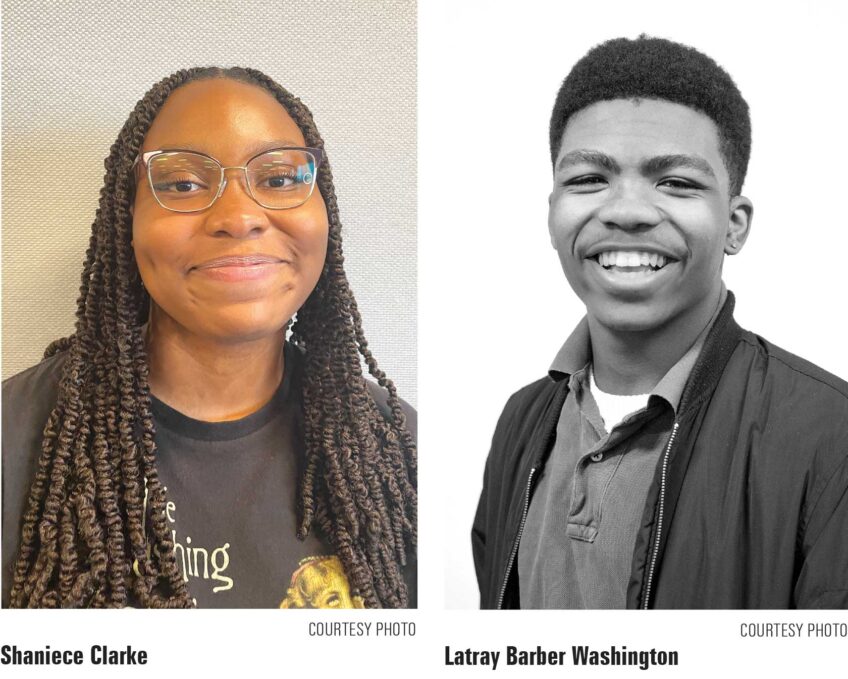
Nikole Hannah-Jones surveyed the large diverse audience before her in the seemingly open-to-the-sky great hall lobby of Massachusetts College of Art and offered a jovial, light-hearted greeting.
“If this is what Boston looks like, I’ll have to come back,” Hannah-Jones said, setting the stage for an hour that felt like a family affair.
The quip from the MacArthur Fellowship awardee and Pulitzer Prize-winner for the 1619 Project in the New York Times opened the keynote conversation with the Boston Globe’s Jeneé Osterheldt June 15 at Embrace Boston’s Embrace Ideas Festival.
Hannah-Jones traced the genesis of the 1619 Project, which centered slavery and Black contributions in American history, to her journalism roots as an 11-year-old whose letter to the editor was published in her hometown newspaper in Waterloo, Iowa. Her missive was on the importance of Jesse Jackson’s second campaign for president in 1987-1988. That experience, she said, gave her an early grasp of the power and importance of words.
Now, Hannah-Jones said, she embraces “the label of activism” and stresses its necessity to the voice of the Black community.
“There is no neutrality for the Black Press,” she continued, quoting the Washington Post’s motto, “Democracy Dies in Darkness.” Nor is that motto a neutral position, she said, expressing the belief that democracy matters and that journalists’ role is to make those in power accountable for upholding it.
When she was 15, Hannah-Jones took a one-semester elective course in Black Studies, the African-American Experience, at Waterloo West High School, with the only Black male teacher she had from kindergarten to the 12th grade. She learned more about the history of Black Americans from that course than she had in all her previous years of schooling. She recalls being astounded, empowered and angered.
When that teacher gave her a copy of Lerone Bennett’s Black history book, “Beyond The Mayflower,” she read for the first time about the slave ship the White Lion arriving in America in 1619, the year before the Mayflower.
Hannah-Jones said she fell in love with history because as she began to study it, certain things linking slavery to Black inequality in America began to make sense. She realized that history as it is often taught can mean only what we are allowed to remember. She wanted to write about equality by answering the question, “Who is causing the suffering?”
The perception of the majority of white people she encountered was that as a Black woman, she “was not even supposed to be in the room,“ she said. She felt those people were going to try to deny her, so she made herself “undeniable, flaming red hair and all.”
Hannah-Jones talked about her successful pitch of the 1619 Project to her editors at the Times as the “blackest s…t” the paper had ever published. She later apologized for her frequent use of profanity during her presentation, noting that she would never speak that way to her grandmother, who was born on a cotton plantation in Greenwood, Mississippi, but explained that the audience made her feel so comfortable. Most of those gathered laughed and shook their heads in understanding whenever she used profane words.
During the isolation of the COVID-19 pandemic in 2020, she was feeling the burden of the criticism from fellow Times reporters of her 1619 Project and how it was getting to her, perhaps creating self-doubt, she said.
That memory prompted Osterheldt to talk about her own “Beautiful Resistance” project in the Globe being “born from a lifetime of packing away pain.”
Hannah-Jones next told the story of the University of North Carolina voting to deny her lifetime tenure and offering a five-year contract instead. She described her ultimate revenge as “strategic vengeance.”
Having studied the dynamics of power for some time, she said it was her “Lebron James moment,” referring to when the professional basketball star announced on television, “I’m taking my talents to Miami Beach,” leaving Cleveland. Hannah-Jones told Gayle King on CBS that she was leaving UNC for Howard University, where she is now a tenured professor and in 2022 founded the Journalism and Democracy Center.
To conclude the conversation, Osterheldt asked Hannah-Jones what makes her life a “beautiful resistance?”
Hannah-Jones responded that everything about her work is intentional. She said even as a New York Times reporter, she was expected to look a certain way. Instead, she wanted to send a message.
“The choice of my curly red hair makes them angry, and I love it. I don’t have anything to apologize for, and neither do any of you,” she said.







